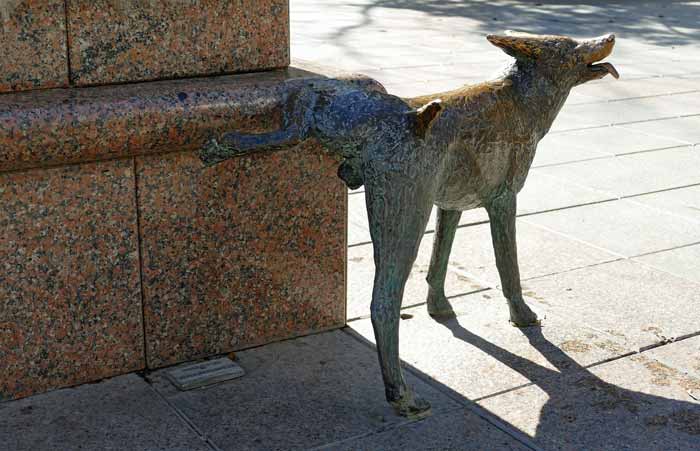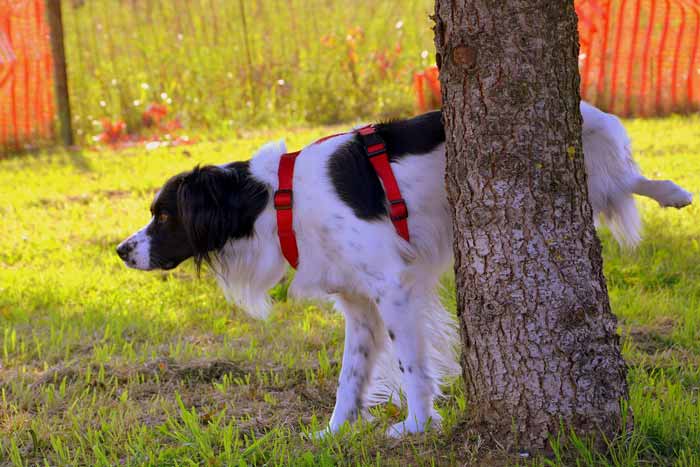Dogs are territorial animals and urine marking is a normal territorial behavior and one of the most common.
But it’s important to know how and why do dogs mark their territory in order to know when there is a problem and to be able to solve it assertively.
We must be able to identify if the marking of our dog is out of control, he has a medical issue or there is another problem that must be addressed.
How Do Dogs Mark Their Territory
Through various behaviors, dogs claim spaces, areas or objects that they consider theirs.
For example, a dog usually barks when he perceives that an intruder is in his territory in order to warn him and keep him away from his home.
But the most common behavior that a dog uses to mark his territory is with a scent mark through a small amount of urine, mainly on vertical surfaces.
Urine marking is not a bad behavior. But there are occasions that it can get out of control and become a problem, mainly inside our home.
Why Do Dogs Mark Their Territory
For dogs, marking their territory is a form of communication that has nothing to do with the concept of domination. It is actually a territorial behavior that has to do with relationships and social hierarchies between dogs.
Marking allows a dog to let other dogs know that he is there, and in some cases, if he or she is available to have a partner.
Beyond being a basic means of communication between dogs, there are several reasons why your dog marks his territory.
Unspayed and Unneutered Dogs
Urine marking is a territorial behavior that is related to sexuality and hierarchical relationships between dogs. Because of this, dogs that have not been spayed or neutered are more likely to mark territory.
Although marking behavior is typical of male dogs, unspayed female dogs also tend to urine mark territory, especially just before and during heat.
Keep in mind that dogs that have been neutered or spay can mark territory, although it’s less frequent.
Something New Within Their Territory
If a dog perceives something new in his environment, it may feel threatened and will be inclined to mark to reaffirm its property.
This can happen, either when he encounters a strange dog or when he smells the urine of another dog in his environment. Keep in mind that this also happens with the arrival of a new tenant to your home, such as a new baby or a roommate.
Keep in mind that for a dog his territory is not only his home, but also the places he visits regularly or the streets where he walks.
Social Situations and Interactions
Some social situations and interactions cause a dog to be inclined to mark. These situations can vary greatly from dog to dog.
There are male dogs that mark when they are next to a female. But some dogs only mark when they are interacting with other male dogs.
Other dogs only urine mark when in certain situations and interactions with other dogs they become very excited or overstimulated.
Stress and Anxiety
Dogs also tend to mark when they feel anxious or stressed.
Many situations can stress a dog. Anxiety can be caused by the presence of another pet, person or new object in his environment, or by a change in his daily routine.
It can be identified because an anxious dog tends to mark with more urine and in unusual places, such as on surfaces that are not vertical.
How Do I Know If My Dog Is Marking or Peeing
There are times when we think that our dog is marking his territory, but in reality, there may be other reasons to be ruled out behind a similar behavior.
Medical Issues
Urinary Incontinence
Incontinence occurs when a dog cannot control his bladder. This can range from small occasional urine leaks to completely emptying the bladder involuntarily.
Urinary Tract Infection
It’s an infection in the urinary bladder caused by a bacteria in the environment or intestines. This infection can cause an increase in the frequency and urgency of urinating in a dog.
Diabetes Mellitus
Some symptoms of diabetes in dogs are increased urination and recurrent infections, mainly of the urinary tract.
Other Medical Causes
Other medical issues that can cause house soiling are increased urine production (Polyuria), abnormalities of dog genitalia or medications that cause frequent urination.
These and other medical causes must be ruled out before treating a dog for urine marking problems.
For this reason, take your dog to be checked by a vet.
Other Reasons Causing Urination Problems
House Training Problems
Whether it is a newly adopted adult dog that you do not know its history, a puppy, or a dog that has always lived outside, most likely he has not been potty train.
It’s always necessary to house train a dog to stop soiling inside the house.
Submissive or Excitement Urination
Some dogs urinate when they are very excited or intimidated.
There are submissive dogs that urinate to try to communicate that they are not a threat. This usually happens when they greet unknown people or pets, or when they are scolded and punished.
This is more common in puppies, although it can also happen to some adult dogs, especially in fearful dogs.
Separation Anxiety
When a dog only urinates indoors when left alone, he might have separation anxiety.
Some dogs being alone and away from their family causes them a lot of anxiety. This anxiety can manifest itself in many ways, and one is urinating excessively and urine marking at home.
How to Prevent Urine Marking Behavior

Spay or Neuter Your Dog
Spaying or neutering your dog will reduce or eliminate marking behavior. To be more effective it is recommended to do it before he starts marking.
Keep in mind that spaying or neutering your dog does not always eliminate the behavior completely, although it can reduce it considerably.
Be the Leader of the Pack
Establishing a clear hierarchy within your pack helps reduce dog marking behavior. By clearly stating that you are the leader, your dog will have less need for urine-mark.
Obedience Training
Training has benefits in your dog’s overall behavior, including territorial urine marking.
On one hand, obedience training helps you bond better with your dog and establish yourself as the leader of the pack.
On the other hand, lack of mental stimulation and boredom can lead to excessive dog marking, so a basic training routine helps keep your pet mentally stimulated and entertained.
Dog Socialization
Dog socialization has many benefits in their general behavior, including territorial behaviors.
Some of its benefits are:
- It may help to make dogs more self-confident and be able to handle anxiety and stress better.
- It may help reduce separation anxiety.
- It may help to keep your dog entertained and mentally stimulated.
How to Stop a Dog From Marking Inside the House
Some tips that can help you are:
Remove Smell From Marked Surfaces
Cleaning soiled areas helps remove your dog’s need to urine mark the place again.
Products containing enzymes are good at eliminating the smell of urine.
Products with ammonia should be avoided as the smell is similar to dog urine and may encourage marking rather than prevent it.
Keep Objects That Cause Marking out of Reach
There are objects that a dog may be tempted to mark. These objects can be the belongings of the guests or new objects brought home.
It is recommended to store these objects in a closet or on a high shelf.
Restrict the View Outside Your Home
The presence of animals near your home can cause urine marking.
Access to doors and windows should be restricted to your dog so that he cannot see the animals and pets nearby.
Change the Meaning of Urine Marked Areas
Make previously marked areas unattractive to urinate. You can feed him, give treats and play with your dog in those areas to change its meaning for your dog.
Get Acquainted With the New Housemate
When someone new comes to live at your home, be it a person or another pet, it can cause your dog to start marking.
Your dog should be properly introduced to the new roommate or pet and have time to bond, become familiar, and get to know him well.
How to Stop a Dog From Marking Outside

It’s not recommended to completely stop a dog from marking outside during his walks. This can be very frustrating for a dog and cause him to start marking inside your home.
What is recommended when urine marking outside gets out of control and becomes a problem, is to control the marking, but never try to remove it completely.
To control marking during walks:
- Leash training helps decrease the number of times your dog marks when he goes for a walk.
- Keeping the leash short does not allow your dog to be smelling all the things he comes across, preventing him from having to mark.
- You can also train your dog to only mark in the places that you allow. Train him with positive reinforcement, rewarding him when he marks in the places you choose.
What Should Not Be Done
Do not scold or punish your dog. It’s useless. Your dog will not relate the punishment with what he did, even if you scold him immediately after doing it.
On the contrary, scolding can cause anxiety and stress in your dog so he will be more inclined to mark again.
Related Questions
Do Dogs Mark Their Territory With Poop?
Most commonly, they mark with small amounts of urine on vertical surfaces.
Why Does My Dog Mark in Other People’s Houses?
But it is also usually caused when your dog feels anxious because he is in an unknown place, with new people.
Final Thoughts
Urine marking in dogs is a normal behavior.
But in certain situations, it can get out of control and become a problem. Likewise, it can easily be confused with something else, be it a medical issue or another type of urination problem.
For these reasons, it’s always necessary to know how the behavior of our dog manifests, in order to help him. It’s also important to know when to seek help from a veterinarian or a professional dog behaviorist.
Resources
- Urine-marking behavior: How to prevent it by The Human Society of the United States
- Urine Marking in Dogs by Pets WebMD

